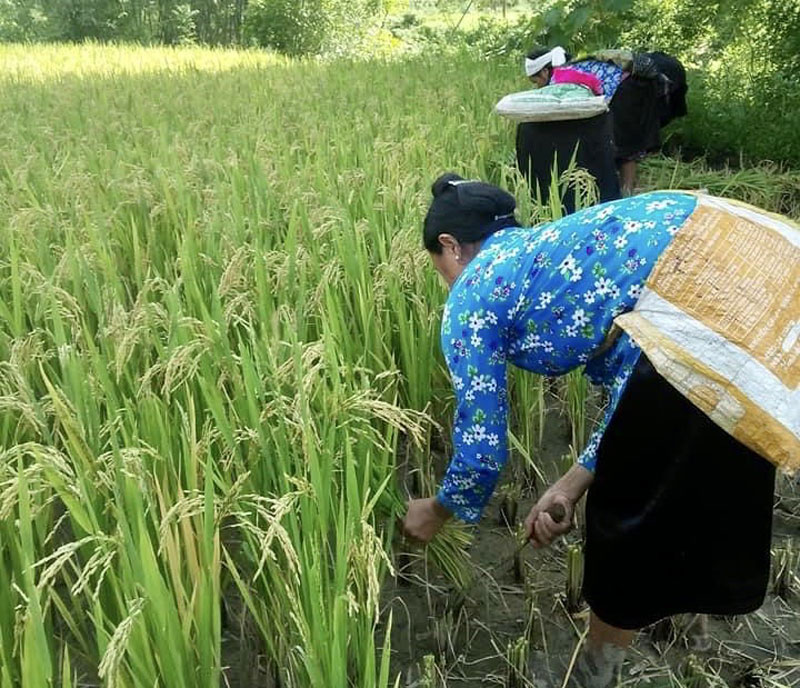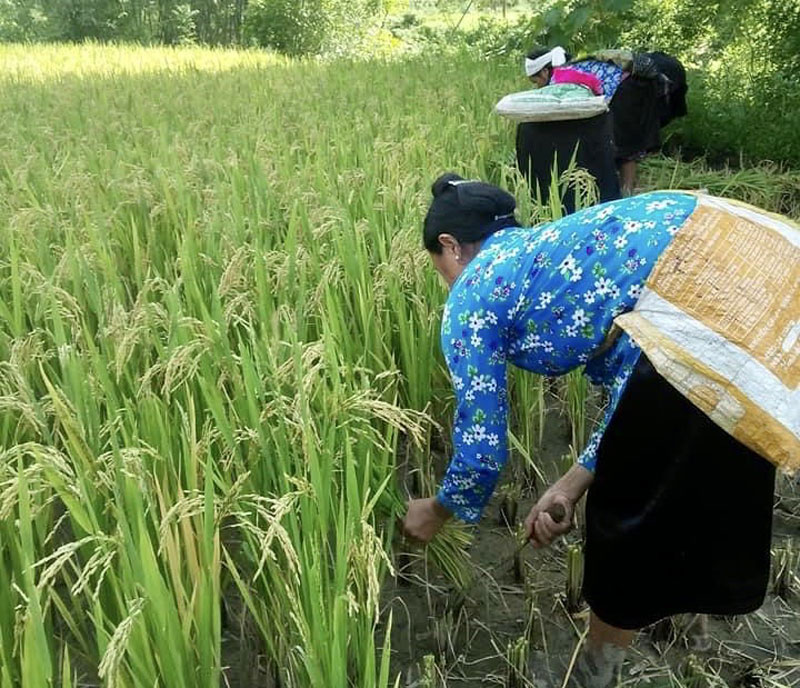
(HBO) – The mountainous district of Da Bac is now in the harvest time of the spring rice crop. Since this crop, farmers in the communes of Muong Chieng, Dong Chum, Doan Ket and Tan Pheo have gained more momentum as J02, the local rice speciality, was given the collective trademark certificate.
 Farmers in Nhap hamlet of Dong Chum commune (Da Bac district) harvest
the J02 spring rice crop, which generates 6 tonnes of paddy per ha.
Farmers in Nhap hamlet of Dong Chum commune (Da Bac district) harvest
the J02 spring rice crop, which generates 6 tonnes of paddy per ha.
The variety has been grown on a trial basis in
Da Bac since 2015. Muong Chieng commune was the first locality to cultivate
this Japanese-origin variety, which was imported and selected by the
Agricultural Genetics Institute.
Right in the first crop, this variety showed
outstanding strengths. In particular, though it is grown in various areas
nationwide like Phu Tho, Hai Duong and Hai Phong, the J02 rice in Da Bac tastes
much better than the one farmed in other localities, which is attributable to
the local mountainous terrain that creates high day-night temperature
difference – an ideal condition for the J02 variety that prefers cold weather.
J02 is currently cultivated on a large scale in
the communes of Dong Chum (15ha), Muong Chieng (40ha), Tan Pheo (10ha), Giap Dat
(10ha), and Doan Ket (25ha), with the annual farming area of over 250ha and an
output of 6 tonnes per ha each crop.
In 2020, the Da Bac Farmers’ Union has provided
the right to use the collective trademark for 11 farming households and
production and business establishments in the district.
Consumers now can recognise the J02 rice of Da
Bac via its specific package and logo. Local authorities are also stepping up
advertising and expanding the distribution network for the speciality,
including groceries, rice stores, traditional markets, and minimarts in densely
populated areas in Hoa Binh province and Hanoi.
A recent survey showed that consumers have
certain preference for the J02 rice of Da Bac. Up to 52.5 percent of the
respondents in Hoa Binh city said they use this kind of rice. In Hanoi, this
was also the opinion of 68 percent of the consumers interviewed in Hoang Mai
district, 56 percent in Ha Dong district, 66 percent in Dong Da district, and
82 percent in Hai Ba Trung district./.
According to data from the Hoa Binh Provincial Party Committee, the industrial production index for the first six months of 2025 is estimated to have increased by 20% compared to the same period last year. This marks the highest year-on-year growth rate for this period since 2020.
In the first six months of 2025, Hoa Binh province’s export turnover was estimated at 1.145 billion USD, marking an 18.11% increase compared to the same period in 2024. Import turnover was estimated at $ 804 million, a 17.15% increase, which helped the province maintain a positive trade balance.
The lives of the ethnic minority farmers in Tan Lac district have gradually improved thanks to the new directions in agricultural production. This is a testament to the collective strength fostered through the professional associations and groups implemented by various levels of the district’s Farmers’ Union.
With the motto the "product quality comes first,” after nearly one year of establishment and operation, Muong village’s Clean Food Agricultural and Commercial Cooperative, located in Cau Hamlet, Hung Son Commune (Kim Boi district), has launched reputable, high-quality agricultural products to the market that are well-received by consumers. The products such as Muong village’s pork sausage, salt-cured chicken, and salt-cured pork hocks have gradually carved out a place in the market and they are on the path to obtaining the OCOP certification.
In the past, the phrase "bumper harvest, rock-bottom prices" was a familiar refrain for Vietnamese farmers engaged in fragmented, small-scale agriculture. But today, a new spirit is emerging across rural areas of Hoa Binh province - one of collaboration, organisation, and collective economic models that provide a stable foundation for production.
Maintaining growing area codes and packing facility codes in accordance with regulations is a mandatory requirement for agricultural products to be eligible for export. Recently, the Department of Agriculture and Environment of Hoa Binh province has intensified technical supervision of designated farming areas and packing facilities to safeguard the "green passport" that enables its products to access international markets.



 Farmers in Nhap hamlet of Dong Chum commune (Da Bac district) harvest
the J02 spring rice crop, which generates 6 tonnes of paddy per ha.
Farmers in Nhap hamlet of Dong Chum commune (Da Bac district) harvest
the J02 spring rice crop, which generates 6 tonnes of paddy per ha.